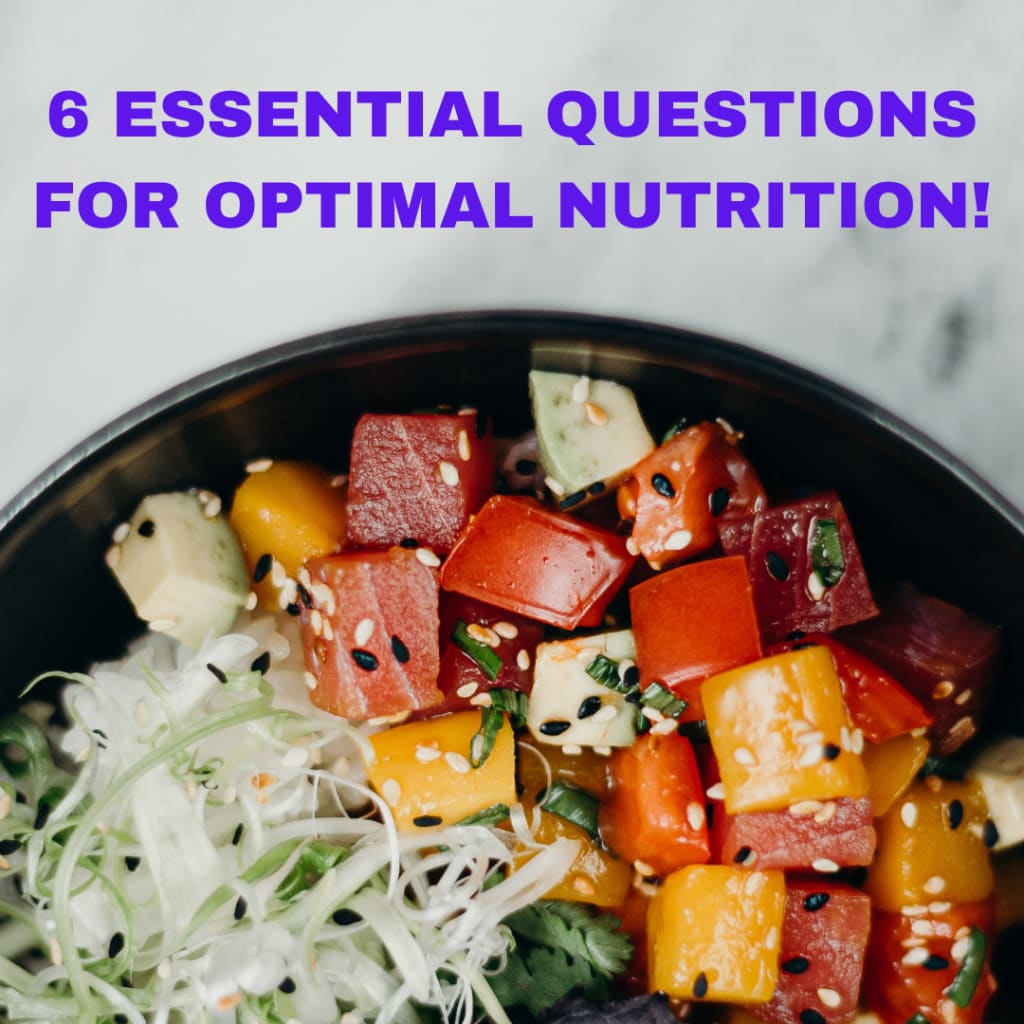Nourishing Insights: Uncover the 6 Essential Questions for Optimal Nutrition
Discover the Key Inquiries to Unlock a Healthier and Balanced Diet

What are the reasons behind the unhealthiness of fast food?
Fast food is often considered unhealthy due to several factors:
High in unhealthy fats: Fast food is typically high in unhealthy fats such as trans fats and saturated fats. These fats can raise cholesterol levels and increase the risk of heart disease.
Excessive calories: Fast food meals are often high in calories, mainly due to large portion sizes and the inclusion of high-calorie ingredients like cheese, mayonnaise, and sugary sauces. Consuming excessive calories can lead to weight gain and obesity.
Added sugars: Many fast food items contain added sugars, including sugary drinks, desserts, and sauces. High sugar intake can contribute to weight gain, increase the risk of type 2 diabetes, and negatively impact dental health.
Lack of nutrients: Fast food tends to be low in essential nutrients such as vitamins, minerals, and fiber. Instead, it often contains refined carbohydrates and processed ingredients that lack nutritional value.
Sodium content: Fast food is typically high in sodium, which can contribute to high blood pressure and increase the risk of heart disease and stroke. Excessive sodium intake is a common concern in fast food due to the use of salt, processed meats, and condiments.
Processing and additives: Fast food often relies on processed ingredients, including preservatives, artificial flavors, and colorings. These additives can have negative health effects and may be linked to conditions like allergies, hyperactivity, and certain cancers.
Lack of variety and freshness: Fast food menus often lack diversity in terms of fruits, vegetables, and whole grains. Instead, they focus on refined grains, fatty meats, and processed ingredients. A diet lacking in variety and fresh, whole foods can lead to nutrient deficiencies over time.
It's important to note that not all fast food options are inherently unhealthy. Some establishments offer healthier choices, such as salads, grilled options, or options with lower calorie counts. However, it is the overall dietary pattern of relying heavily on fast food and consuming it frequently that can have detrimental effects on health.
Despite its negative health effects, why is unhealthy food still being sold?
Unhealthy food continues to be sold for several reasons:
Demand and consumer preference: Unhealthy food often appeals to people's taste preferences, convenience, and affordability. There is a significant demand for fast food and other unhealthy options, and businesses respond to consumer choices to maximize profits.
Profitability: Unhealthy food can be more profitable for food businesses due to lower ingredient costs, longer shelf life, and faster preparation times. This incentivizes the production and sale of such food items.
Marketing and advertising: The food industry invests heavily in marketing and advertising, creating persuasive campaigns to promote unhealthy products. These strategies can influence consumer choices and generate sales.
Lack of awareness or misinformation: Some individuals may not be fully aware of the potential health risks associated with consuming unhealthy food. Others may be influenced by misleading or incomplete information, making it easier for businesses to sell these products.
Convenience and accessibility: Fast food and unhealthy options are often convenient and readily available. They can be found in numerous locations, including drive-thrus, airports, and shopping centers, catering to people's busy lifestyles and desire for quick meals.
Cultural and social factors: Eating habits and food choices are influenced by cultural norms, social interactions, and personal preferences. Unhealthy food may be deeply ingrained in certain cultures or social contexts, making it challenging to shift dietary patterns.
It's important to note that there are ongoing efforts to increase awareness about the importance of healthy eating and to encourage food industry changes, such as menu labeling regulations, promoting healthier options, and implementing taxes or regulations to reduce the consumption of unhealthy food.
What are some of the healthy foods for Keto diet?
The keto diet focuses on high-fat, low-carb foods, so some healthy options include:
Avocado - high in healthy fats and low in carbs
Leafy greens - such as spinach, kale, and lettuce, which are low in carbs and high in nutrients
Nuts and seeds - such as almonds, chia seeds, and flax seeds, which are high in healthy fats and protein
Berries - such as strawberries, raspberries, and blackberries, which are low in carbs and high in fiber and antioxidants
Fatty fish - such as salmon, tuna, and mackerel, which are high in healthy fats and protein
Coconut oil - a source of healthy fats that can be used for cooking and baking.
It's important to note that while these foods are healthy options for the keto diet, it's still important to consume a variety of nutrient-dense foods to ensure you're meeting your body's needs.
What are the reasons why canned foods are not generally recommended as healthy food options?
Canned foods are not necessarily unhealthy, but there are some potential downsides to consider. One concern is that many canned foods are high in sodium, which can contribute to high blood pressure and other health problems. Additionally, some canned foods may contain added sugars or preservatives, which can be detrimental to health if consumed in excess.
Another potential issue is that some canned foods may be lined with materials that contain bisphenol A (BPA), a chemical that has been linked to various health problems. While many companies have begun using BPA-free linings in their canned products, it's still important to read labels and choose products carefully.
That being said, there are many healthy canned food options available, such as canned beans, tomatoes, and fish. When choosing canned foods, it's important to read labels and look for products that are low in sodium and free from added sugars and preservatives. It's also a good idea to incorporate fresh, whole foods into your diet whenever possible.
What are the most underrated superfoods that provide a wide range of health benefits?
There are many superfoods that provide a wide range of health benefits, but some of the most underrated ones include:
Turmeric - Turmeric is a spice that contains curcumin, a powerful anti-inflammatory and antioxidant compound that may help to reduce inflammation, improve brain function, and lower the risk of chronic diseases.
Pumpkin seeds - Pumpkin seeds are a great source of protein, healthy fats, and minerals such as magnesium and zinc. They may also help to lower blood sugar levels and improve heart health.
Kefir - Kefir is a fermented dairy product that contains probiotics, which can help to improve gut health and boost the immune system.
Hemp seeds - Hemp seeds are a rich source of protein, healthy fats, and minerals such as iron and magnesium. They may also help to reduce inflammation and improve heart health.
Seaweed - Seaweed is a nutrient-dense food that is rich in minerals such as iodine, calcium, and magnesium. It may also help to reduce inflammation and improve heart health.
These superfoods may not always be top of mind, but they can provide many health benefits and are worth incorporating into your diet.
What is the most unhealthy fast food?
It's difficult to pinpoint one specific fast food item as the "most unhealthy" since many fast food items are high in calories, unhealthy fats, sodium, and added sugars. However, here are a few fast food items that are generally considered to be among the most unhealthy:
Large French fries - French fries are high in calories, unhealthy fats, and sodium. A large order of French fries from a fast food restaurant can contain upwards of 500-600 calories and 20-30 grams of fat.
Double bacon cheeseburger - Burgers that are loaded with bacon and cheese are high in calories, unhealthy fats, and sodium. A double bacon cheeseburger can contain 800-1,000 calories or more.
Fried chicken sandwich - Fried chicken sandwiches are typically high in calories and unhealthy fats. Some fast food restaurants offer fried chicken sandwiches that contain 700-800 calories or more.
Milkshakes - Milkshakes are high in added sugars and calories. A large milkshake from a fast food restaurant can contain 800-1,000 calories and 100 grams of sugar.
It's important to remember that fast food should be consumed in moderation and as part of a balanced diet. When eating fast food, it's a good idea to choose healthier options such as grilled chicken sandwiches, salads, and fruit cups whenever possible.
If you liked the article, reward me with a gift as support for me to continue writing
About the Creator
LOZY WORLD
I am an accomplished writer and promoter of a balanced lifestyle through mindful eating. With a deep-seated interest in the relationship between food and well-being, I try to make the connection between healthy eating habits and health.






Comments
There are no comments for this story
Be the first to respond and start the conversation.